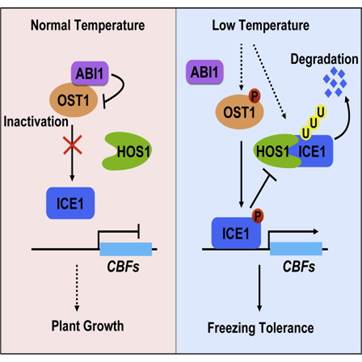植物应答低温信号研究取得重要进展
来源:《Developmental Cell》
作者:杨淑华等
时间:2015-04-17

随着全球气候的变化,低温已经成为经济作物减产的主要因素之一,严重威胁世界粮食安全。所以,研究植物抵抗低温的机制具有重要的理论价值和实际生产指导意义。中国农业大学杨淑华课题组一直致力于植物响应低温的分子机制的研究,并取得了一些重要进展。近日,该课题组报道了蛋白激酶参与植物低温响应答的分子机制,研究成果在《发育细胞》上发表。
冷驯化过程是植物抵抗低温的一种有效的保护机制。在这个过程中,低温能迅速诱导CBFs 基因的表达,进而诱导下游COR基因的表达,合成相关保护性的物质,尽可能保护植物免受低温的伤害。CBF调控网络作为植物响应低温的重要途径备受人们的关注。但是,其上游有哪些组分尤其是蛋白激酶的调控并不清楚。
杨淑华等人的研究发现,植物激素ABA信号途径中的重要蛋白激酶OST1 参与了植物低温应答。通过突变体的筛选发现,OST1基因的缺失导致植物抗低温能力下降,过表达OST1增强植物的抗低温能力;基因表达分析证明OST1调控植物响应低温依赖CBF调控网络。
该项研究完善了ICE1-CBF低温信号调控网络,也为研究激素和低温信号之间的关系提供了新的思路。该研究得到了国家自然科学基金重点项目、杰青项目和创新群体的资助。(来源:中国科学报 崔雪芹)
OST1 Kinase Modulates Freezing Tolerance by Enhancing ICE1 Stability in Arabidopsis
Abstract Cold stress is a major environmental factor that limits plant growth and development. The C-repeat-binding factor (CBF)-dependent cold signaling pathway is extensively studied in Arabidopsis; however, the specific protein kinases involved in this pathway remain elusive. Here we report that OST1 (OPEN STOMATA 1), a well-known Ser/Thr protein kinase in ABA signaling, acts upstream of CBFs to positively regulate freezing tolerance. The ost1 mutants show freezing hypersensitivity, whereas transgenic plants overexpressing OST1 exhibit enhanced freezing tolerance. The OST1 kinase is activated by cold stress. Moreover, OST1 interacts with both the transcription factor ICE1 and the E3 ligase HOS1 in the CBF pathway. Cold-activated OST1 phosphorylates ICE1 and enhances its stability and transcriptional activity. Meanwhile, OST1 interferes with the interaction between HOS1 and ICE1, thus suppressing HOS1-mediated ICE1 degradation under cold stress. Our results thus uncover the unexpected roles of OST1 in modulating CBF-dependent cold signaling in Arabidopsis.
原文链接:
http://www.sciencedirect.com/science/article/pii/S1534580714008442/pdfft?md5=dc8b9d82a11bd40ebf7da63c4bfb8e7e&pid=1-s2.0-S1534580714008442-main.pdf




